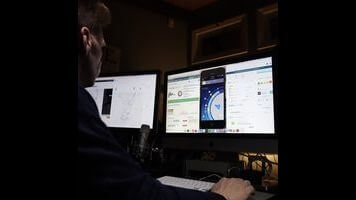Dark Net shines a dim light on high-tech fears

Showtime’s new eight-part docuseries wants to be the real-life version of Black Mirror: an ominous anthology of cautionary tales about the sinister technology pervading our lives. It succeeds to a certain extent, but the limitations of Dark Net’s format skew the series more toward a sensationalist skimming of the surface, rather than an edifying plunge into the depths of technology’s dark side.
The series is produced by Vocativ, a tech company that uses proprietary software to data mine the deep web, that secret menu of the internet used by tech-savvy folks to hire hit men and find octopus porn. The implication is that Dark Net will open a window to the mysterious underbelly of the internet, but at least in its first two episodes, the series doesn’t delve any deeper than a Google search. Its structure resembles one, too: Each episode starts with brief snippets from the three stories it will cover, like search-engine previews providing just enough information to get us to click and learn more.
When most people imagine the darkest recesses of the web, the first thing that comes to mind is, naturally, weird sex stuff. So it’s no surprise that Dark Net starts there with its premiere episode, “Crush,” featuring three true tales of sexuality facilitated (or exposed) by the web. We meet Drew and Kristie, a couple who at first appear to be carrying on a typical long-distance relationship. They Skype before bedtime and text each other pictures of their food, and when he gets to work, she tells him to close his office door, get down on his knees, and send her photographic proof he’s complied.
So yes, they have a long-distance BDSM relationship, and Kristie is the dominant one. This makes for some logistical difficulties (Drew has to whip himself and apply his own nipple clamps), but what’s fascinating is the way Kristie has taken standard-issue apps like food diaries and location tracking and repurposed them into “pervertables” she uses to control Drew. Every minute of his life belongs to her whims, so while he’s forced to wear a chastity cage around his junk most of the day and send selfies as confirmation on demand, she’s free to have straight sex with other men and taunt him with her own visual proof. To an outsider, Drew’s life looks exhausting, but to him it’s “so humiliating, it’s arousing.” Although he’s submitted to a total invasion of his privacy, they’ve signed a “terms of service” agreement in which she agrees not to share any of it publicly. They do know this is going to be on television, right?
The episode also takes us to Japan, where an increasing number of young men are abandoning human relationships altogether in favor of a virtual girlfriend named Rinko—a cute anime character who will never break up with them or demonstrate any will or agency of her own. Both of these stories fall under the heading of “whatever floats your boat”; we may find them odd, but human sexuality is vast and unknowable, and at least no one’s getting hurt. (Well, technically Drew is getting hurt, but it’s consensual and he enjoys it, so it’s all good.) That’s not the case with the third story, in which a young woman named Anisha finds herself the target of an ex-boyfriend’s revenge-porn spree. Her nude selfies end up on over 2,000 websites, sometimes accompanied with her real phone number and address. Worse yet, Anisha’s ex responds to messages by posing as her and saying things like, “I’m going to open the door and act like I don’t know you because my fantasy is to be raped.”
In devoting 10 minutes or less to each of these stories, Dark Net provides little more than sound bites and superficial perspective. That’s fine if your goal is to hold YouTube attention spans, but it’s a particular failing in the case of Anisha’s story, which would benefit from more in-depth treatment than the alarmist “sending nude pictures could ruin your life” gloss it’s given here.
The second episode, “Upgrade,” is devoted to bio-hacking and offers a similar mix of intriguing-but-frustratingly underdeveloped stories. A cheerful Swedish woman is eager to have a RFID (radio-frequency identity) chip containing all her personal data implanted in her hand. A filmmaker who managed to shoot his eye out as a child has a camera implanted in his vacant eye socket, like the Terminator or the Six Million Dollar Man. “The world’s most connected human” tracks everything he does electronically via over 700 apps. It makes for an effectively creepy half-hour (“Your heartbeat is in my data,” connected guy Chris Dancy tells a first date he met on Grindr after strapping a smart watch to his wrist). But the only outside voice to place these stories in a larger context is a narrator given to portentous statements about our lives becoming gigabytes of data uploaded to the cloud. The subject matter is worthy of the docuseries treatment, but Dark Net is a shallow wade into the deep web.